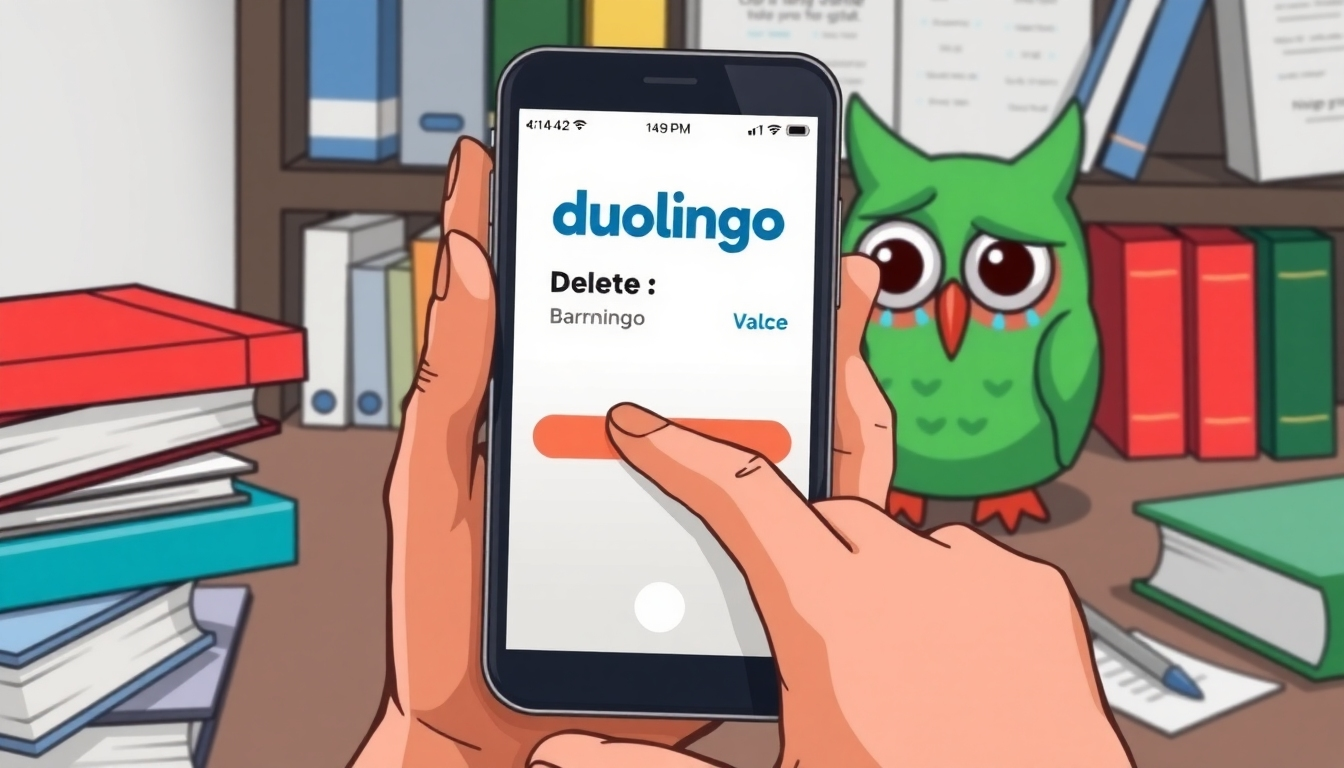
Imagine diligently learning a new language, excitedly progressing through lessons, only to find that your favorite app has transformed into an ad-heavy, gamified experience that prioritizes profit over education. This is the rising sentiment among long-time Duolingo users…
Understanding the Shift in User Sentiment
The landscape of language learning apps is changing. One app, in particular, is facing a wave of criticism: Duolingo. Users are expressing their dissatisfaction, and it’s becoming hard to ignore. Why is this happening? Let’s dive into the growing concerns surrounding Duolingo’s monetization strategies and the sentiments of its loyal users.
Growing Concerns About Monetization Strategies
Duolingo has shifted its focus in recent years. Many users feel that the app has become more about profit than about learning. This shift is evident in several ways:
- Increased advertisements interrupting lessons.
- Higher subscription prices following its IPO.
- Less emphasis on user experience and more on shareholder satisfaction.
As one user put it,
‘It’s like they stopped caring about our learning experience.’
This sentiment resonates with many who have been using the app for years. They feel betrayed, as if the app they once loved has transformed into something unrecognizable.
User Experiences Shared on Reddit
Reddit has become a platform for users to voice their frustrations. Prominent posts on subreddits like r/NoStupidQuestions highlight the growing discontent. Users share their experiences, often reminiscing about the earlier, more user-friendly versions of Duolingo. They miss the days when the app felt like a community-driven project rather than a profit-driven machine.
Many users are now suggesting alternatives. Some of the most mentioned include:
- Lingonaut.app: A community-led project aimed at creating an ad-free experience.
- Deutsche Welle: Praised for its German courses.
- Busuu, Babbel, Mango Languages, and Pimsleur: Each offers unique approaches to language learning.
This shift towards alternatives shows a clear message: users are looking for platforms that prioritize their learning experience over monetization.
Sentiment of Betrayal Among Loyal Users
For many long-time users, the changes in Duolingo feel like a betrayal. They have invested time and effort into learning languages through the app, only to see it evolve into something that prioritizes profit over education. The emotional manipulation through gamification features has left many feeling uncomfortable. Users have expressed that the app now feels like a game to beat rather than a tool for genuine learning.
Comments from users reflect this sentiment. One user noted that they feel trapped in a cycle of progressing through lessons without truly acquiring language skills. The focus seems to have shifted from education to entertainment, leaving many feeling dissatisfied.
The Community-Led Lingonaut Project
In response to these frustrations, the community has taken action. The Lingonaut project aims to bring back the essence of Duolingo before its monetization strategies took over. This initiative is a testament to the loyalty of users who want to see a return to a more educational and less commercial approach to language learning.
As discussions continue on platforms like Reddit, it’s clear that many users are not just voicing complaints; they are actively seeking alternatives. The dissatisfaction is palpable, and it raises important questions about the future of language learning apps. Will they prioritize user experience, or will they continue down the path of monetization?
The trend of uninstallation and discontent is growing. Users are not just passive observers; they are taking charge of their learning experiences. As they navigate these changes, it’s evident that the demand for authentic, user-centric applications is stronger than ever.
The Role of AI and Advertisements in Language Learning
Language learning apps have become a staple for many. But recent changes at Duolingo have sparked significant debate. Users are questioning the platform’s direction. Are these changes really beneficial for learners? Or are they just a way to boost profits?
Duolingo’s Shift to an ‘AI-First’ Strategy
Duolingo’s CEO recently announced a bold move towards an ‘AI-First’ strategy. This means that artificial intelligence will play a central role in creating language courses. Sounds innovative, right? But not everyone is on board. Many users feel uneasy about this shift. They worry that AI might replace human educators. What happens to the personal touch that teachers bring?
Some users have expressed their concerns on platforms like Reddit. They fear that the reliance on AI could lead to job losses for language educators. This raises a crucial question: Is it worth sacrificing human interaction for technological advancement?
Concerns Over Job Security for Language Educators
The potential layoffs of existing course staff have caused a stir. Users are voicing their fears about job security. They see the shift to AI as a threat. After all, language learning is about connection and communication. Can a machine truly replicate that?
Many educators have dedicated years to helping students learn. They bring experience, empathy, and understanding. Replacing them with AI could lead to a loss of valuable insights. As one user put it,
‘AI should enhance learning, not replace it.’
This sentiment resonates with many who believe that technology should support, not replace, human educators.
Users Rejecting AI-Driven Educational Content
As Duolingo embraces AI, some users are pushing back. They are rejecting the AI-driven educational content. Why? Because they feel it lacks the depth and engagement of traditional methods. The app has become increasingly commercialized, filled with ads that interrupt lessons. This shift has left many feeling frustrated.
Users have reported that the gamification features, once a highlight of the app, now feel manipulative. They describe a sense of being pushed to engage with the content, rather than genuinely learning. One user mentioned that it feels more like “beating the app” than making real educational progress. This is a troubling trend. When learning becomes a game, what happens to the actual learning?
The Impact of Advertisements
Alongside the AI shift, the rise in advertisements has also raised eyebrows. Users are noticing that ads interrupt nearly every lesson. This can be frustrating, especially for those who have invested time and effort into learning a new language. The increase in prices following Duolingo’s IPO has further fueled dissatisfaction. Are profits taking precedence over user experience?
Many long-time users are seeking alternatives. Platforms like Lingonaut.app are emerging as advertisement-free options. Others, like Deutsche Welle, are praised for their quality courses. This shift indicates a growing desire for educational content that prioritizes learning over profit.
Conclusion
The transition to AI and increased advertisement placements have left users feeling uneasy about the future of personalized learning. As discussions unfold, it’s clear that many are searching for a balance between technology and human interaction. The future of language learning may depend on how well we can integrate these elements without losing sight of what truly matters: effective learning experiences.
Exploring Alternative Language Learning Platforms
Introduction to Lingonaut
Have you ever felt frustrated with your language learning app? You’re not alone. Many users are turning away from Duolingo, seeking alternatives that truly cater to their needs. One such platform is Lingonaut. Designed with a user-driven approach, Lingonaut aims to provide a more personalized learning experience. It’s currently being developed by members of the Duolingo subreddit, focusing on being advertisement-free. This is a refreshing change, especially for those tired of constant ads interrupting their lessons.
Overview of Other Platforms
While Lingonaut is gaining traction, several other platforms are also worth considering:
- Busuu: This platform offers interactive language courses with a community aspect. You can practice with native speakers, which is a huge plus.
- Babbel: Known for its structured lessons, Babbel focuses on real-life conversations. It’s great for those who want practical language skills.
- Mango Languages: This platform emphasizes cultural context along with language learning. It’s perfect for those who want to dive deeper into the culture behind the language.
Each of these platforms has its unique strengths, catering to different learning styles. Whether you prefer community interaction or structured lessons, there’s something for everyone.
User Reviews: Duolingo vs. Alternatives
As users express their dissatisfaction with Duolingo, many are sharing their experiences with these alternatives. A common sentiment is that Duolingo has shifted from a user-friendly platform to one focused on profit. Users have reported that the app is now laden with ads and gamification features that detract from actual learning. One user even mentioned feeling like they were “beating the app” rather than genuinely acquiring language skills.
In contrast, platforms like Lingonaut are being praised for their focus on user experience. As one user put it,
‘It’s refreshing to see a platform that prioritizes user experience.’
This highlights a growing desire for learning tools that prioritize educational value over profit.
Comparing Features and User Experiences
When comparing these platforms, consider the following:
- User Experience: Lingonaut’s user-driven design is a significant draw. Users appreciate the absence of ads and the focus on meaningful learning.
- Course Structure: Babbel’s structured lessons and Busuu’s community interaction provide different approaches that some users find more effective than Duolingo’s current model.
- Learning Outcomes: Many users report feeling more accomplished and engaged with alternatives that emphasize real-life application and cultural context.
As you explore these options, think about what you value in a language learning platform. Are you looking for community interaction, structured lessons, or a focus on cultural context? Your preferences will guide you toward the best fit.
Growth of Alternative Platforms
Interestingly, alternative platforms are seeing a surge in interest. Over the past year, growth statistics indicate that more users are seeking meaningful learning experiences. This shift reflects a broader trend in language learning, as users become more discerning about their educational tools.
As the landscape of language learning continues to evolve, it’s clear that many are ready for a change. With platforms like Lingonaut and others stepping up to fill the gap, the future of language learning looks promising for those seeking a more authentic experience.
The Future of Language Learning: A Call for User-Centric Approaches
Language learning is evolving. But is it evolving in the right direction? The recent discussions surrounding apps like Duolingo have sparked a heated debate. Users are questioning the shift from human-made content to AI-driven experiences. Many feel that this change is not in their best interest.
The Ongoing Debate: Human-Made vs. AI-Driven Content
Imagine you’re learning a new language. Would you prefer a friendly tutor or an algorithm? This question lies at the heart of the current debate. Users are expressing dissatisfaction with the increasing reliance on AI in language learning apps. They argue that AI lacks the personal touch that makes learning engaging.
- Many users feel that AI-driven content can be impersonal.
- There’s a growing sentiment that human interaction is essential for effective learning.
- Statistics show that a significant number of users prefer human interaction over AI assistance.
As one user put it,
‘Learning should feel less like a game and more like a journey.’
This sentiment resonates with many who feel that gamification has taken precedence over genuine learning experiences.
Community-Driven Initiatives Supporting Educational Integrity
In response to these concerns, community-driven initiatives are emerging. Users are banding together to create alternatives to mainstream apps. For example, the Duolingo subreddit has initiated the development of Lingonaut. This platform aims to provide a more user-friendly experience, free from ads and focused on real learning.
Other alternatives, like Deutsche Welle and Busuu, are gaining traction. These platforms are praised for their commitment to educational integrity. They offer courses that prioritize user experience over profit. This shift highlights a growing demand for community-driven solutions in language learning.
The Need for Platforms to Listen to User Feedback
Have you ever felt unheard by a platform you use? Many users of language learning apps feel the same way. There’s a pressing need for these platforms to listen to their users. Feedback is crucial for improvement. When users express dissatisfaction, it’s a signal that something needs to change.
Duolingo’s recent shift to an “AI-First” approach has raised eyebrows. Users worry about the potential layoffs of course staff and the increasing number of ads. This shift seems to prioritize shareholders over the learning experience. As a result, many users are uninstalling the app and seeking alternatives.
Frustrations are mounting. Users report feeling manipulated by gamification tactics. They describe the experience as less about learning and more about “beating the app.” This cycle can lead to a lack of genuine language acquisition.
Reflecting on Broader Trends in Educational Technology
The dissatisfaction with language learning apps reflects broader trends in educational technology. Users are increasingly aware of the importance of agency in their learning journeys. They want to feel in control, not just passive participants in a system driven by algorithms.
As the conversation continues, it’s clear that the future of language learning must be user-centric. The ongoing discussion points toward the necessary evolution of language learning apps. They should prioritize user experience over profit-driven motives.
In conclusion, the future of language learning is at a crossroads. The debate over human-made versus AI-driven content is more than just a trend; it’s a call to action. Community-driven initiatives are paving the way for a more user-centric approach. As users, you have the power to demand better experiences. Platforms must listen to your feedback and adapt accordingly. Only then can language learning truly become a journey worth taking.
TL;DR: As dissatisfaction with Duolingo grows due to ads, profit-centric changes, and AI integration, users are exploring alternative language learning platforms.








